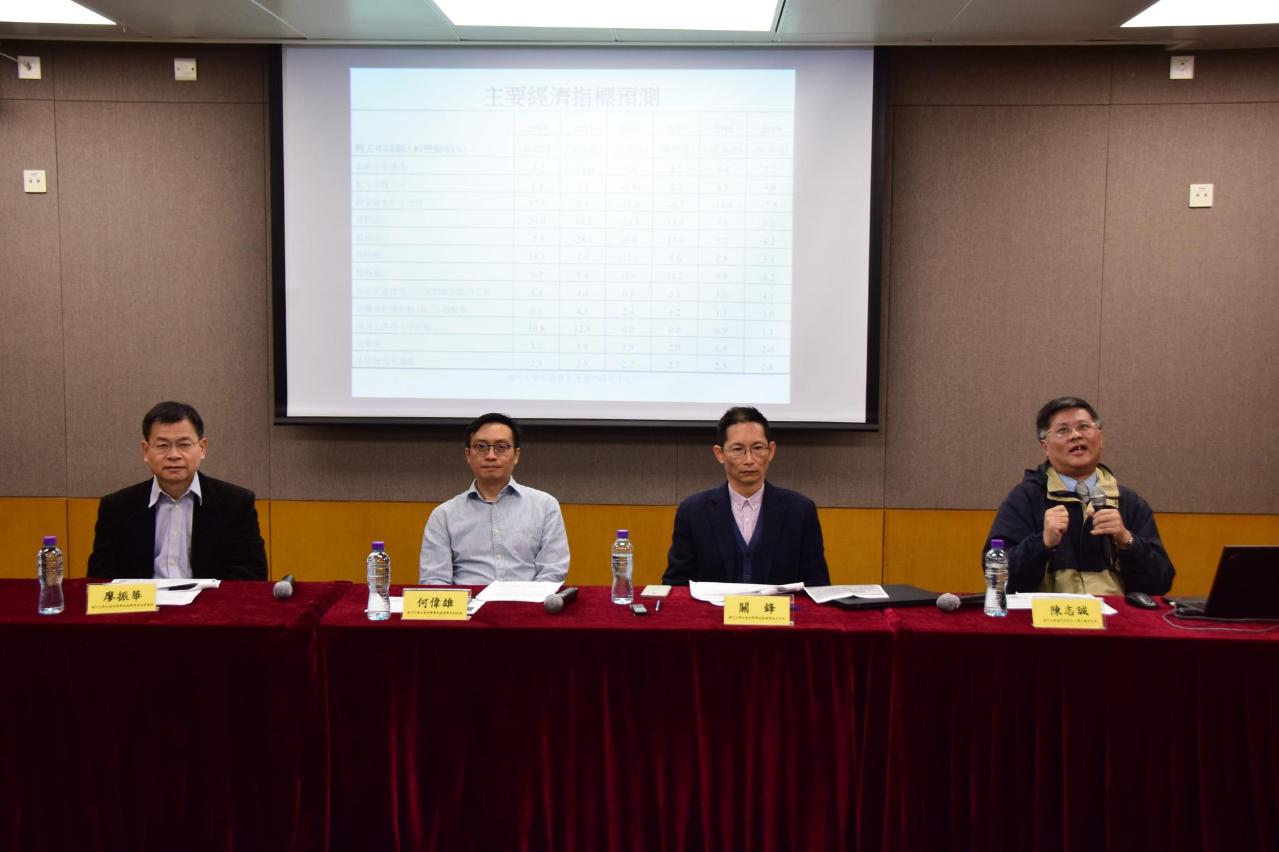 UM announces the Macroeconomic Forecast for Macao 2019
UM announces the Macroeconomic Forecast for Macao 2019
The University of Macau (UM) Department of Economics and Centre for Macau Studies today released its Macroeconomic Forecast for Macao 2019. According to the data collected, Macao’s economy has grown substantially with rates of 9.4% and 5.9% year-on-year in the first and second quarter of 2018 respectively. The growth subdued rapidly amid the disaster effect of Typhoon Mangkhut in September. Macao’s economy grew only by 1.6% year-on-year and reached MOP 100.9 billion in the third quarter of 2018 (Figure 1 and 2). The negative effects of trade friction with the United States and other structural adjustments on China’s economy have surfaced in the past few months. Economic uncertainty continues to affect Macao’s economy. As a result, we have revised our forecasts downward on GDP growth from the last release.
Macao’s Recent Economy
The following highlights the situation of the different sectors of Macao’s economy:
- External demand of services was mainly driven by mainland China. With expected slowdown in China’s economic growth and the closing of casinos amid the hit of Typhoon Mangkhut in September, the Chinese visitors’ spending in Macao, in particular on the gaming activity, grew slower. The exports of services were MOP 83.5 billion, growing by 6.3% year-on-year in the third quarter of 2018. Meanwhile, the exports of services in gaming, the largest portion of the exports of services, were MOP 55.3 billion, up 5.8% year-on-year.
- In the third quarter of 2018, the nominal gross gaming revenue was MOP 73.8 billion, up by 10.2% year-on-year and up by 0.2% quarter-on-quarter. Revenue from the VIP baccarat was MOP 40.1 billion, increasing by 3.6% year-on-year and decreasing by 2.3% quarter-on-quarter respectively.
- In October 2018, the total visitor arrivals were 3.15 millions, up 9.2% year-on-year. Visitors from mainland China recorded 2.31 millions, up 12.1% year-on-year and visitors from Hong Kong were 0.51 millions, up 9.3% year-on-year.
- Exports of goods faded again in the third quarter of 2018. It has decreased by 8.8% year-on-year to 3.1 billion MOP.
- For the third quarter of 2018, the imports of goods rose by 2.9% year-on-year to MOP 24.9 billion. Amid the demand for gaming services went up slower, imports of services increased only by 3.0% year-on-year to 9.3 billion MOP.
- Within the imports of goods, consumer goods increased by 16.9% year-on-year in the third quarter of 2018 amid a steady growth in the consumer spending. Meanwhile, raw material and semi-manufactures rose by 17.6% year-on-year. Capital goods increased by 18.9% year-on-year.
- With stable earnings, Macao residents’ spending grew modestly. Private consumption expenditure was MOP 25.3 billion, increasing 4.1% year-on-year in the third quarter of 2018. The household final consumption expenditure in domestic market and the expenditure abroad increased by 3.8% and 5.9% year-on-year respectively.
- Private gross fixed capital formation continued to decline amid the finishing of major hotels and casinos construction. It decreased by 17.8% year-on-year in the third quarter of 2018 to MOP 12.2 billion. Meanwhile, government gross fixed capital formation decreased by 32.7% year-on-year. Total gross fixed capital formation decreased by 20.1% to MOP 14 billion. Private construction investment and private equipment investment declined by 20.6% and 1.0% year-on-year respectively.
- Real estate transaction slowed down in the third quarter of 2018. The total number of resident units purchased and sold was 2,383 amounting to MOP 14.5 billion, down 22.0% and 24.5% quarter-to-quarter respectively. 216 residential units were sold for over MOP 10 million; 1,396 units for MOP 4 million to under MOP 10 million; 626 units for MOP 2 million to under MOP 4 million; and 145 units for MOP 2 million or less. As regard to the floor area of residential units, 1,074 units (45.1% of total) had an area of 50 to 99.9 square meters. The average transaction price of the residential units went down by 3.5% quarter-to-quarter to MOP 103,844 per square meter. The average transaction price of the residential units with an area of 50 to 99.9 square meters registered a decrease of 5.1% quarter-to-quarter to MOP 98,466 per square meter respectively.
- Inflation rate was increasing steadily amid higher demand from residents. The Composite Consumer Price Index on October 2018 rose by 3.4% year-on-year. For the two largest components of the Composite Consumer Price Index, food and non-alcoholic beverages, and housing and fuel, their year-on-year growth rates were 2.9% and 3.0% respectively. For the aggregate economy, in tandem with consumer price, the GDP deflator increased by 3.8% year-on-year in the third quarter of 2018.
- The labour market continued to be tight. Unemployment rate for the third quarter of 2018 was 1.8%, which is the same level as the second quarter of 2018. Excluding non-resident workers, the unemployment rate for residents was 2.4%, the same level as the second quarter of 2018.
- The total employment and employment for residents were 387.6 thousand and 285.3 thousand in the third quarter of 2018, up 1.5% and 2.3% year-on-year respectively. Analysed by the industry, employment in wholesales & retails was 43.1 thousand, down 4.6% year-on-year and employment in hotels & restaurants was 56.7 thousand, up 3.1% year-on-year. Employment in construction was 31.9 thousand, a decrease of 1.2% year-on-year along with the slowdown in private construction investment. Employment in gaming industry was 84.4 thousand, up 4.3% year-on-year with the revival of gaming industry.
- Median monthly employment earnings went up 6.7% year-on-year to MOP 16,000 in the third quarter of 2018. For the gaming sector which accounted for the largest share of the employed population, median monthly employment earnings were MOP 20,000, up 5.3% year-on-year. The median monthly employment earnings for the other major industries such as wholesales & retails were about MOP 12,800, up 1.6% year-on-year while the median monthly employment earnings for hotels & restaurants were MOP 12,000, increasing by 20.0% year-on-year.
Macroeconomic Forecast for 2019
In October 2018, the International Monetary Fund (IMF) projected global economy to grow at 3.7% in both 2018 and 2019. The forecasts were revised downward from April 2018. The downward revision reflects surprises that suppressed activities in early 2018 in some major advanced economies, the negative effects of the trade measures, as well as a weaker outlook for some key emerging market and developing economies. US GDP is expected to expand at 2.9% and 2.0% in 2018 and 2019 respectively. The economic growth of the Euro Area is likely to increase by 2.0% and 1.9% in 2018 and 2019 respectively. For mainland China, the negative effects of the trade friction with the US and other structural adjustments have surfaced. The economic grew at 6.5% in the third quarter of 2018. This caused Hong Kong, another major market of Macao’s service exports, to have a slower economic growth. It grew by 2.9% in the third quarter of 2018. Economic uncertainty continues to affect Macao’s economic growth in 2019.
Macao's exports of services are expected to grow slower with 4.2% in 2019. Exports of goods are expected to increase by 0.6% in 2019. Concomitant with the steady growth in local consumption, imports of goods are expected to rise by 3.1% in 2019. Amid the slower rise in exports of services, the imports of services will expand modestly. The growth rates of imports of services are expected to increase by 4.2% in 2019.
For domestic demand, private consumption spending continued to grow steadily. It is expected to grow at 4.0% in 2019. Total investment is expected to decline at 7.9% in 2019.
Inflation, as measured by the change in the Composite Consumer Price Index, is expected to be steady. Inflation rate is expected to be 3.0% in 2019. For the aggregate economy, the GDP price deflator is forecast to increase by 4.1% in 2019.
The labour market continues to be tight. Unemployment rate is forecast to be 2.0% in 2019. Excluding non-resident workers, the unemployment rate of residents is expected to be 2.8% in 2019. Median monthly employment earnings are forecast to be MOP 16,205 in 2019.
For the whole economy, Macao’s GDP is expected to grow by 2.7%, ranging from a pessimistic rate of -6.5% to an optimistic rate of 11.9% in 2019. The exports of services are highly influenced by external economic conditions and government policies. They may adjust greatly throughout the year. We will update the forecast to reflect the possible adjustment regularly.
About the Macroeconometric Structural Model of Macao
The Macroeconometric Structural Model of Macao is a quarterly simultaneous-equations econometric model which currently covers seven blocks of the Macao economy --- consumption, investment, external sector, prices, government, labour market, and monetary sector. Time series data used is collected from a period starting from 1998’s first quarter and updated once new data is available. Its results provide the community with a timely understanding on the state of the Macao economy and facilitate the decision-makers to make prudent choices for the future.
(For figures and tables in the press release, please refer to attachments)


